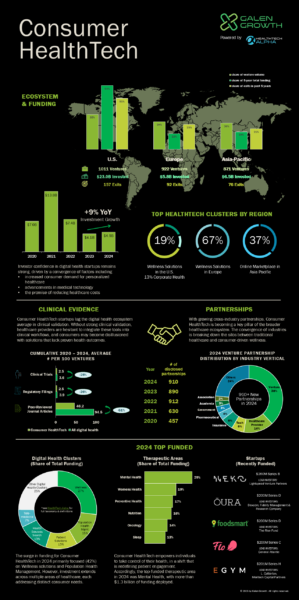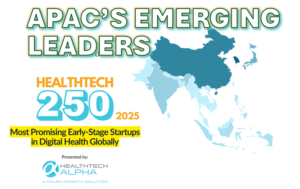TL;DR
- Consumer HealthTech Investment Surging: 9% year-on-year growth in 2024, outpacing the broader digital health sector.
- AI, Remote Monitoring & Preventive Care Lead Innovation: High investor interest in AI-driven diagnostics, wearables, and proactive health solutions.
- Startups Driving Healthcare Integration: Emerging leaders are those aligning with traditional healthcare systems for cost-effective, scalable solutions.
- Strong Clinical Validation Gaining Priority: 20% of Consumer HealthTech ventures in the U.S. now have proven efficacy through trials and peer-reviewed research.
- Future of Healthcare is Consumer-Driven: Consumer HealthTech is reshaping the industry with smarter, more sustainable, and patient-centered solutions.
- Read the full report to gain deeper insights into how these trends impact industry stakeholders.
A New Dawn for Consumer HealthTech: What the Analysis Reveals
The Consumer HealthTech sector is undergoing a fundamental transformation. A surge in investment, coupled with rapidly evolving technologies and changing patient behaviours, is reshaping the industry’s landscape. As investors recalibrate their strategies in response to economic pressures, regulatory shifts, and technological breakthroughs, the trajectory of consumer healthtech innovation is entering a crucial phase.
According to Galen Growth’s latest analysis, total investment in Consumer HealthTech has continued to rise, with 9% year-on-year investment growth, compared to 6% growth seen across the entire digital health ecosystem, according to Galen Growth’s 2024 Funding and Key Trends report. While valuations are stabilising, interest in AI-driven diagnostics, remote patient monitoring, and preventative care solutions remains robust.
This recalibration presents both opportunities and challenges. The next wave of growth will be driven by startups that can integrate seamlessly with traditional healthcare infrastructures, offering both cost-efficiency and improved patient outcomes.
Investment Trends: Capital Flows Backed by Structural Shifts
Investor confidence in digital health — and particularly Consumer HealthTech — remained notably resilient in 2024, with a 9% year-on-year increase in Consumer HealthTech investment from 2023 to 2024. At the heart of this capital momentum is an empowered consumer base. Individuals are demanding care that is personalised, proactive, and digitally accessible — a trend accelerated by post-pandemic behavioural shifts. From chronic disease management to mental wellbeing, consumers are seeking tools that meet them where they are — on their phones, in their homes, and on their own terms.
In parallel, technological maturity across AI, biosensors, remote monitoring, and data integration is lowering the barrier to innovation while raising expectations around precision, personalisation and scalability.
These forces have translated into sustained investment velocity. While macroeconomic headwinds have tempered exuberance in some sectors, digital health remains a capital priority for funds with long-term theses around value-based care, platform ecosystems and healthcare decentralisation.
Here are recent large investments in Consumer HealthTech:
- Neko Health, $260 million Series B led by Lightspeed Venture Partners
- EGym, $201 million Series H led by L. Catterton and Meritech Capital Partners
- Flo Health, $200 million Series C led by General Atlantic
- Ōura, $200 million Series D led by Dexcom and Fidelity Management & Research Company
- Foodsmart, $200 million Series D led by The Rise Fund
Cross-Industry Convergence: Healthcare Without Walls
The consumerisation of health is dissolving legacy silos. Increasingly, we are seeing a confluence of players — from retail and fitness to pharma and tech — co-creating solutions that straddle both wellness and care. Over 900 new partnerships were disclosed by Consumer HealthTech ventures in 2024. This convergence not only accelerates innovation but redefines who delivers health, and how.
Regulatory Tailwinds and Market Maturity
The regulatory environment is also evolving, with new guidelines shaping how Consumer HealthTech companies operate. Investors are increasingly factoring in compliance frameworks, favouring startups that proactively align with evolving standards.
Consumer HealthTech startups are building evidence of solution efficacy to ensure that consumers do not become disillusioned with solutions that lack proven health outcomes. In the U.S., 20% of the ventures in this sector have proven solutions through either clinical trials, regulatory filings, or peer-reviewed publications. Without strong clinical validation, healthcare providers are hesitant to integrate these tools into clinical workflows.
Conclusion: The Consumer Health Revolution is Just Beginning
Galen Growth’s analysis reveals that Consumer HealthTech isn’t just a trend—it’s a game-changer for the future of healthcare. By shifting the focus from reactive treatment to proactive care, it eases the burden on overstretched hospitals and healthcare providers, helping create a more sustainable system. It improves health outcomes by enabling early detection and real-time monitoring, catching issues before they become critical. Cutting-edge technologies like AI-driven diagnostics and digital biomarkers are making precision medicine a reality—delivering treatments tailored to each person’s unique genetic makeup and lifestyle.
This isn’t just innovation—it’s the foundation of smarter, more efficient, and more human-centered healthcare.
To explore these insights in greater depth, read the full report and understand what’s next for consumer health.
Why This Matters: Implications for the Industry
For Startups:
The consumer health sector remains a high-potential market, but the recent bankruptcy announcements in the sector have investors scrutinising financial sustainability more than ever. Startups must build robust business models that align with industry shifts towards personalised, AI-enhanced, and preventative care solutions.
For Investors:
Market recalibration presents both risk and opportunity. Investors who identify the next wave of consumer health innovation early—particularly in AI, wearables, and hybrid care—stand to benefit from long-term industry transformations.
For Industry Leaders:
The integration of big tech, pharma, and insurance players into the consumer health space suggests that traditional healthcare silos are breaking down. Companies that embrace technology-driven partnerships will be best positioned to capture emerging market value.









